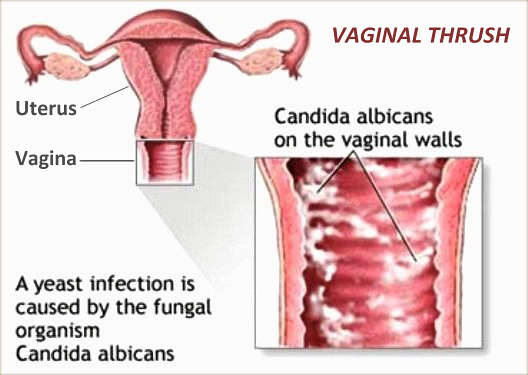What Causes Vaginal Thrush?
Thrush is caused by yeasts, usually Candida albicans, which live on the skin, in the mouth, gut and vagina, usually without causing problems. Yeasts like warm and moist conditions, but are kept under control by bacteria and the body's immune system. Certain conditions upset this natural balance, allowing yeasts to overgrow. This results in the typical symptoms of thrush.
What Are The Symptoms Of Thrush?
• Itching. This is the most common and distressing symptom affecting the delicate skin of the vulva.
• Soreness. The vagina and vulva become inflamed, causing redness and soreness. Rubbing and scratching can make this soreness worse and the skin of the vulva can become swollen.
• Vaginal discharge. This is heavier and thicker than normal, usually white and a bit like cottage cheese. It has a characteristic smell although it is not unpleasant.
• Stinging when passing urine. This stinging is caused by urine touching sore and inflamed tissues of the vulva.
• Pain during sex. Some women who have thrush repeatedly may notice pain during sex and intense itching without much discharge.
Thrush is cured by antifungal treatments that stop the growth of yeasts.
• Local treatment. Pessaries are applied directly into the vagina and cream applied onto the vulva.
• Oral treatment. One capsule of antifungal taken by mouth or two doses of two tablets by mouth in a day.
Both types of treatment work equally well, but some women find local treatment messy. They are both available over the counter from pharmacists or can be prescribed by a doctor.
What You Should Do If You Think You Have Thrush
Go for help to your GP, your local sexual health (genito-urinary medicine) clinic or family planning clinic.
If this is your first episode of thrush, make sure that you definitely have thrush rather than some other vaginal infection. It is unwise to buy medication over the counter if the diagnosis has not been confirmed. A doctor or nurse will usually examine your vulva and vagina and take samples which are sent for analysis to see if yeast is present.
Vaginal discharge and itching may be due to some other more serious infections, such as bacterial vaginosis, trichomonas or chlamydial infection. Occasionally genital herpes may be confused with thrush.
Thrush may arise without having sexual intercourse and so is not necessarily sexually transmitted, although some men (particularly if they are not circumcised) develop symptoms of redness or itching under the foreskin and will need treatment. Treatment of the male partner will help to prevent recurrence in the woman.
Factors Known To Increase The Risk Of Thrush
• Use of antibiotics
Antibiotics kill off the 'good' bacteria which control the growth of yeasts. Some antibiotics are particularly associated with causing thrush.
• Diabetes
If your blood sugar levels are poorly controlled, yeasts may grow out of control.
• Drugs
Some drugs, for example steroids and drugs which suppress the immune system, encourage the growth of yeasts or interfere with the body's control mechanisms.
• Hormonal Changes
Many women get their first attack of thrush when they are pregnant. Pregnancy seems to produce an ideal environment for yeasts to grow.
Older contraceptive pills containing high doses of oestrogen were found to make some women more susceptible to thrush, but the new lower dose contraceptives have smaller amounts of hormones and seem less likely to trigger thrush. You may notice that thrush often develops before a period, possibly due to hormonal changes.
• Other Factors
Some women find that using bath oils, perfumed soaps or vaginal deodorants seem to cause thrush. Sexual intercourse may also bring on an attack of thrush or make symptoms worse.
Self-Help During An Attack Of Vaginal Thrush
If you cannot get to a doctor or chemist immediately, try washing in a diluted salt solution (one teaspoon of table salt to one pint of water in a basin or take a salt bath). This soothes the tissues and prevents growth of yeasts. Other ways you can help yourself include:
• Avoiding having sex.
• Avoiding damage to the tissues by not scratching, rubbing or washing excessively.
• If the attack does not respond quickly, or you get repeated attacks, check with your doctor that you definitely have thrush.
• Unsweetened natural yoghurt relieves some women's symptoms if applied direct to the vulva.
Some women find that they can help to prevent attacks of thrush but a minority, despite all of their best efforts, continue to get it.
Checklist To Help Prevent Thrush
• If you are prescribed a course of antibiotics and you are prone to thrush, ask your doctor to prescribe you treatment for thrush at the same time
• Avoid perfumed soaps, vaginal toiletries, douching and avoid putting anything in your bath
• Take care of your health, eat sensibly and exercise
• Wipe from front to back after a bowel movement. This will avoid carrying infection from the anus to the vagina
• Avoid wearing tight, synthetic clothing, especially if you are prone to thrush





















No comments:
Post a Comment